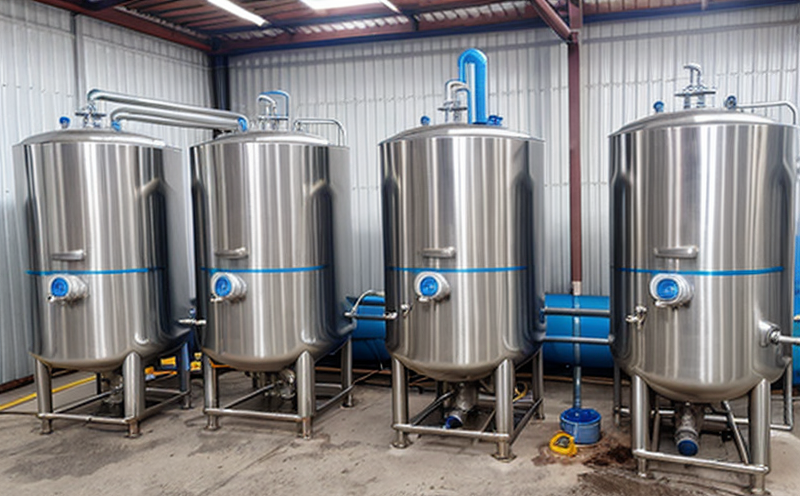ASTM D6975 Biofilm Formation Test in Cooling Water
The ASTM D6975 biofilm formation test is a critical method used to evaluate the potential for biofilm development in industrial cooling water systems. This procedure assesses whether bacteria and other microorganisms can adhere to surfaces, forming a protective layer that can significantly impact system efficiency and reliability.
Biofilms are communities of microorganisms that adhere to surfaces submerged in fluid. In industrial settings like power plants, chemical manufacturing facilities, and HVAC systems, biofilm formation can lead to fouling, corrosion, and reduced heat transfer efficiency. The ASTM D6975 test provides insights into the conditions under which these biofilms form, allowing for proactive management of water quality.
This test is essential for maintaining optimal operational performance in cooling water systems. By understanding the conditions that favor biofilm formation, facilities can implement targeted strategies to prevent or mitigate associated issues. This includes adjusting chemical treatments, optimizing flow rates, and selecting appropriate materials for system components.
The ASTM D6975 method involves inoculating a specified volume of cooling water with a known concentration of microorganisms. The sample is then incubated under controlled conditions that mimic real-world operational parameters. After the incubation period, the biofilm formed on the surfaces within the test apparatus is quantified and characterized.
This quantitative assessment helps determine the potential for biofilm growth in similar cooling systems. It also aids in evaluating the effectiveness of different water treatment strategies. The results can be used to optimize maintenance schedules, select appropriate biocides, and enhance overall system hygiene.
The ASTM D6975 test is particularly relevant for facilities that operate large-scale industrial processes requiring extensive water usage. By identifying biofilm formation early in the process, companies can take necessary steps to prevent costly downtime and repairs. This proactive approach not only enhances operational efficiency but also contributes to environmental sustainability by reducing the need for excessive chemical treatments.
Understanding the specific conditions under which biofilms form is crucial for maintaining optimal system performance. Factors such as water temperature, flow rate, and nutrient availability can all influence biofilm development. The ASTM D6975 test provides a standardized method for evaluating these factors in a controlled environment, allowing facilities to make informed decisions about their water management practices.
Furthermore, the results of this test are often used in conjunction with other quality assurance protocols to ensure compliance with industry standards and regulatory requirements. By incorporating ASTM D6975 into routine testing procedures, companies can demonstrate their commitment to maintaining high-quality water systems that meet both operational and environmental goals.
Why It Matters
- Enhanced Operational Efficiency: Preventing biofilm formation in cooling water systems helps maintain optimal heat transfer efficiency, reducing energy consumption and operational costs.
- Reduction in Maintenance Costs: By identifying potential biofilm issues early, facilities can avoid costly repairs and replacements due to fouling or corrosion.
- Mitigation of Environmental Impact: Controlling biofilm formation minimizes the release of biocides into the environment, promoting more sustainable water management practices.
- Improved Product Quality: In processes where cooling water is used for product manufacturing, preventing biofilm contamination ensures consistent and high-quality output.
The ASTM D6975 test plays a pivotal role in these benefits by providing a reliable method to assess the potential for biofilm formation. This information enables facilities to implement targeted strategies that enhance both operational efficiency and environmental stewardship.
Eurolab Advantages
At Eurolab, we offer comprehensive cooling water testing services that go beyond the ASTM D6975 biofilm formation test. Our team of experienced professionals ensures accurate and reliable results, providing actionable insights for your facility.
- Expertise in Industrial Water Testing: With years of experience in industrial water quality management, Eurolab offers a deep understanding of the challenges faced by cooling water systems.
- State-of-the-Art Facilities: Our laboratories are equipped with advanced instrumentation and technology to provide precise measurements and analyses.
- Comprehensive Reporting: We offer detailed reports that include not only the results but also recommendations for improving system performance and compliance.
- Customized Solutions: Eurolab tailors its services to meet the specific needs of each client, ensuring that tests are conducted in a way that is most beneficial for your facility.
By leveraging our expertise and advanced facilities, Eurolab helps ensure that your cooling water systems operate at peak efficiency while minimizing environmental impact. Our commitment to quality and innovation sets us apart as the premier choice for industrial water testing services.
Why Choose This Test
- Precision in Biofilm Quantification: The ASTM D6975 test provides a standardized method for quantifying biofilm formation, ensuring consistent and reliable results.
- Real-World Relevance: By simulating real-world operational conditions, this test helps facilities prepare for the challenges they will face in their water systems.
- Proactive Management: Identifying potential biofilm issues early allows for proactive management strategies that can prevent costly downtime and repairs.
- Regulatory Compliance: The results of this test can be used to demonstrate compliance with industry standards and regulatory requirements, enhancing your facility's reputation for quality and reliability.
The ASTM D6975 biofilm formation test is a vital tool in maintaining optimal cooling water system performance. Its precision, real-world relevance, and proactive nature make it an indispensable part of any comprehensive water management strategy.





